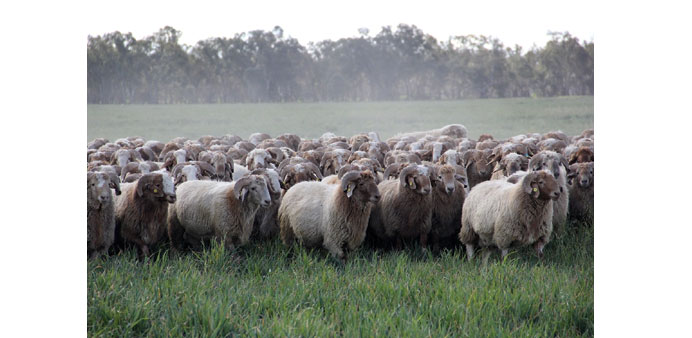Sheep on a Hassad farm in Australia.
Hassad Food has announced the company’s latest achievements in the fields of livestock, grains, rice, poultry, flowers, dates and olive oil in addition to agricultural technology.
The Doha-headquartered company is a leading investor in the food and agri-business sectors.
Hassad Food has launched four “high-quality” rice brands in the local market.
Hassad Food chairman and managing director Nasser Mohamed al-Hajri said: “In line with our strategy of investing in global markets to secure high-quality food resources for Qatar, we are proud to introduce a wide range of the finest Basmati rice variants to the local market, all best suited for the discerning local consumer’s requirements.”
From the plains of India, Hassad Food has brought Danat for its connoisseur consumers in Qatar, offering “premium-quality, extra-long” Indian Basmati rice while Nathry is a “high-quality” long grain Basmati rice variant reaped from the Punjab region of Pakistan.
Nathry Mezzah is a “high-quality long grain parboiled (Sella) Basmati rice variant” and the fourth brand, Thameen, is made especially for the hospitality sector.
Meanwhile, the total amount of Australian sheep supplied by Hassad Australia will exceed 330,000 heads of sheep by the end of December. This represents more than 50% of the local market demand for Australian sheep, all supplied according to specifications set by Widam, a Hassad statement explains.
Over the course of this year, Hassad Australia - Hassad Food’s first international investment - supported the local market demand by supplying three batches of Australian sheep (chilled carcasses). The first batch had more than 50,000 chilled carcasses, supplied between January and February, followed by a bigger batch of more than 100,000 carcasses, supplied in June and July, to cover the peak season (Ramadan).
Finally, they supplied the local market with more than 175,000 for the third batch, which arrived in August and would continue to be distributed until end of the year.
Hassad Australia has also carried out a programme of breeding the Syrian Awassi sheep on its Australian farms to support the ongoing local market demand.
In terms of grains production, Hassad Australia has planted more than 73,000 hectares of commercial crops in 2015, including wheat, barley, canola and others. The 2015 harvest commenced in October and would last until January 2016.
Over the past years, Hassad Qatar has become the largest supplier of fodder products in the local market, the statement notes. Hassad Qatar is a wholly owned subsidiary of Hassad Food.
Spanning over 650 hectares, Hassad Qatar’s commercial operations cover four farms: Al Riffa, Al Sailiya, Irkiyyah and Um Selal, with a production capacity of 8,000 tonnes. There are plans to expand the commercial operations of these farms in addition to Um Barraka farm in north Qatar, to reach 950 hectares by 2018.
With a yearly production capacity of 10,000 tonnes of rice, Senwan Pakistan - another wholly owned subsidiary of Hassad Food - has started exporting “high-quality” rice products to Qatar in line with Hassad Food’s strategy of investing in global viable markets to secure food resources for Qatar.
This year, Hassad Food has become the major shareholder in A’Saffa Foods, the largest integrated poultry project in Oman, with 33% of the shares. A’Saffa plans to expand its annual poultry production capacity from 20,000 tonnes to 60,000 tonnes over the next three years.
The new generation of hydroponic greenhouses tops the achievements of Zulal Oasis, launched through a partnership between Hassad Food and Oasis Agrotechnology to develop and promote cost-effective hydroponic technology to support the local farming mechanism.
The statement notes that Qatar-based Roza Hassad currently produces over 3mn “high-quality” flowers annually in the local and regional markets. Additionally, it has launched a pilot project to produce chemical free vegetables and bedding plants.
Mahaseel is Hassad Food’s marketing arm, responsible for delivering Hassad’s investment to the end user.

